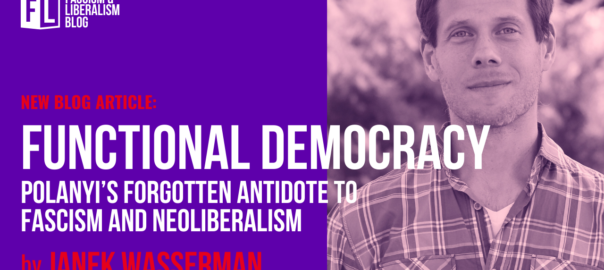Building an anti-fascist Climate Agenda
by Andreas Novy
15.01.2026
Can growth-critical progressives, ecomodernists, and anti-fascist liberals and conservatives find common ground to halt authoritarianism and address the climate crisis? This first piece of 2026 reflects a new area of focus for this blog—the link between neoliberalism, fascism, and the failure of climate politics. Andreas Novy, President of the International Karl Polanyi Society, explains why both “green” and “de-” growth agendas have so far proved unsuccessful in meeting climate targets, and why they are insufficient to defend democracies against fascism. To secure a liveable future, he advocates for moving beyond the climate policy silo to build broad alliances with movements that reject both fascism and neoliberal austerity, before outlining four cornerstones of a new, anti-fascist climate politics.
Current far-right reactionary movements not only share fascism’s anti-egalitarian aspirations, but the same will to merge economic and state power. Controlling the media and the courts, weakening civil society and the opposition, changing electoral rules, even the use of paramilitary violence—these are among the means by which they seek to stay in power. For this reason, we must exclude far-right parties from governing at all costs.
This is, however, insufficient to prevent the return of radical forms of authoritarianism, eugenics, and state violence. Neither decarbonization nor the defense of liberal democracy will be successful if delinked from socioeconomic reforms that not only overcome neoliberalism, but also transform basic pillars of capitalist domination, especially unconditional property rights.
Neither green growth nor degrowth can combat fascism alone
Today’s reactionaries use culture war rhetoric to camouflage their class war intentions. The Thiels, Musks, Mileis, Kickls and Weidels of this world are not populists but elitists who, self-consciously, increasingly defend their backward-oriented supremacist ideologies in public. To counter their strategy, neither mainstream ecomodernist “green growth” strategies, nor “degrowth” movements offer convincing alternatives. The former are naïve with respect to the political-economic preconditions of deep socio-ecological transformations. The latter underestimate the need for unconventional alliances to resist a civilizational backlash that aims at building hierarchical societies to guarantee a good life only for a select few. Such broad alliances are necessary, however, as the far right indiscriminately attack both sides, denouncing them as urban educated, often academic “elites”.
The ecomodernist mainstream has long tried to convince enlightened business to adhere to a green agenda based on science and facts by “bribing” them with de-risking policies: green investment should be good for the environment and for profits. Still today, many believe that both economic and political liberalism are necessary for tackling the climate crisis in pluralist societies. Markets and private corporations together with democracy, human rights, and science offer, so the belief, the necessary preconditions to implement profound ecological changes, including—in line with Fridays for Future—the ability to “listen to science”. What this overlooks, however, is that economic liberal parties—such as Austria’s NEOS or Germany’s FDP—share with the far-right—such as FPÖ and AfD—a defense of market solutions and private property, and an aversion to redistribution. This point barely enters into contemporary debates, and yet, it has severe implications for current economic policies which prioritize competition and growth over achieving climate targets. This is justified—in line with economic liberalism—by austerity and geopolitical competition. And it is grounded in a common supremacist belief that, as per Friedrich Hayek, some must lead and others must follow.
Degrowth research, unlike ecomodernism, is critical of economic liberalism. Nevertheless, it reinforces a narrative that is inimical for alliance-building. If one wants to focus on human flourishing and planetary health, calling alternatives “de-” or “post-growth” risks trapping them in the same imaginary. Neuro-linguist George Lakoff illustrated in his book “Don’t Think of an Elephant“ what Michel Foucault demonstrated with respect to sexuality—showing how “free sexuality” and “demonize sexuality” remain prisoner of the same discourse (or put another way, the more one tries to shift the narrative “beyond growth”, the more the focus stays on growth). To avoid marginalization and build support for new objectives of wellbeing, and better approaches for coordination and planning, the climate movement needs a new language, new discourses and new framings that can move us from words to deeds.
Four cornerstones of anti-fascist climate politics
Right now, climate policies follow a minimalist agenda, centered on the narrow concern of climate neutrality. Substitute this with a target of climate-friendly living however—linking mitigation and adaptation with ecological and social objectives—and such a ‘more-than-climate’ politics widens the horizon to include issues of fairness and social justice. This is an important starting point for creating anti-fascist politics. But anti-fascist climate politics would be more than this.
Anti-fascist climate politics abandons the climate policy silo entirely, including futile debates on growth. And it shares the discursive field of anti-fascist politics which centers pluralism and socioeconomic security in times of turmoil. This broad discursive field has four cornerstones:
First, it seeks to attract progressives, conservatives, and liberals who oppose the far-right. In times of climate crises and geopolitical tensions, the common denominator could be a “transformation by design” approach. This would attempt to alter the current mode of living and producing while maintaining the best of its values and institutions; individual freedoms and human rights being the dearest achievement of Western civilization. Due to the determination of reactionaries for systemic change, transformation is, therefore, a precondition not only for emancipatory transformations but also for preserving certain democratic and egalitarian traditions. This would challenge conservatives to choose between a liberal democratic order and authoritarians who share certain reactionary values. And it would force liberals to choose between an open, democratic, and pluralist society—or the unconditional defense of economic and property rights.
Second, the key anti-fascist learning from the Great Depression of the 1930s was that a living wage and reduced costs of living must be key policy objectives. One can witness the relevance of this lesson today in the success of Mamdani affordable living campaign in New York, and Lula’s minimum wage and welfare policies in Brazil. Neoliberalism has created widespread insecurity and makes striving for a good and stable life an existential challenge. While low-income households struggle to meet basic needs, middle-income households often face relative deprivation, derived from rising cost of living and an eroding margin of comfort. As the latter are decisive swing voters, policies must not limit themselves to guarantee minimum provisioning, but link this to building public and social infrastructures that also reduce living costs for the middle classes. It needs “bread” and “roses” – for all.
Third, such a political shift is only possible with a radical de-concentration of economic power. If billionaires use political donations and can obtain digital platforms to buy the control of state apparatus, the public domain becomes their fiefdom and liberal democratic institutions vanish—a phenomenon we can currently observe in the US. Therefore, progressive taxation, wealth redistribution, and rigid anti-trust regulations—especially for digital platforms and intellectual property rights—are preconditions for science-based public debate and democratic decision-making. As long as commercial and social media remain under the control of billionaires who profit from the climate crisis, climate research is powerless, and sound arguments will never win against billionaire-financed fake news.
Fourth, goods and services can become more affordable and sustainable if needs are satisfied less via commodities and more via infrastructures, such as by urban planning and buildings that maximize resource efficiency. Public planning and better coordination of business, science, civil society, and the state can improve the wellbeing of lower and middle classes by shifting from individual consumption to collective forms of provisioning—such as public transport, community care, social security and state pensions. This requires monetary and fiscal reforms—such as around budget rules, credit guidance and progressive taxation—to increase public funds, redirect investment and stop the transfer of riches to millionaires and billionaires.
Rejecting neoliberal austerity can unite climate and anti-fascist agendas
At this decisive moment, combatting austerity could be a starting point for creating unconventional alliances, as cuts in public spending affect both the lower and middle classes. This could become a key agenda for socioeconomic improvements. But there is much to gain for climate politics as well: under an austerity regime, public funds will never be sufficient to finance the activities necessary to achieve climate targets. And it might be the best way forward to avoid a reactionary systemic rupture that pushes Western civilization back into a 19th century-style society that maximizes the freedom of the privileged few with the correct genes.
For all these reasons, the rebellion against the prevailing liberal economic paradigm should be at the core of a common agenda of climate politics and anti-fascist politics.

Andreas Novy is associate professor and head of the ISSET Institute at WU Vienna and president of the International Karl Polanyi Society (IKPS).
References
Isabella Weber: Anti-Fascist Economic Policy (German-Language) in Jacobin, November 2024: https://jacobin.de/artikel/isabella-weber-preiskontrollen-inflation-trump-biden-antifaschistische-wirtschaftspolitik





